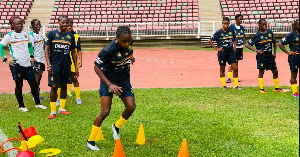Thousands of young refugees marginalised by conflict, poverty and culture now have a chance to overturn their compromised future thanks to an education emergency project engineered by UNICEF and funded by the EU Borgop, Adamawa – In September 2014, as malnutrition and malaria ravaged temporary settlements for Central African refugees in eastern Cameroon, cash-strapped humanitarian workers came close to throwing a sizeable chunk of an entire nation’s future overboard.
“What happens when we have insufficient funds is that we make some very bad trade-offs,” said Robert Piper, the United Nations’ regional humanitarian coordinator for the Sahel, who visited the region and noted that some of the infrastructure had been run-down.
“There are obvious short-term human impacts of lack of resources, but there are some very sinister long-term impacts, which is this terrible trade-off between what is important and what is urgent,” Piper said in an interview.
For thousands of young Central Africans in those refugee camps and many more still on their way, the trade-off meant giving up their education or future for pressing survival needs like food, medicines and shelter.
But the grim prediction made then never came to pass. Less than a year later on 1 March 2015, more than 300 first-year primary school children sat tightly on bright coloured mats in a hall with open walls in this far-flung camp on the eastern border to study.
They were eager to read out sounds and words in choruses and solos, an indication of how much they had learned. Some were only three or four. Others were nearly ten. But they were all in the same classroom.
Between Piper’s bleak forecast last year and March 2015, nearly 20,000 young Central Africans have enroled in temporal learning and protection spaces (TLPS) in parts of the Adamawa and East regions.
About an equal number is still at home – boys looking after cattle and girls given away to marriage. Even then, no one imagined a year ago that so many children would be in school.
A saved generation Central Africa’s two-year-old conflict forced many children out of school. The United Nations Children Fund (UNICEF) also noticed that at least three percent of those crossing the border in Cameroon, some as old as 18, had never been to school even in times of peace.
With meagre resources and piling emergency needs in refugee camps, those bellow the school age and those yet to be born also faced growing up with no literacy and numeracy skills.
A lost generation, it seemed, was in the making. But in interviews and conversations, parents and teachers now talked of the transformation that had taken place in Borgop and other similar settlements for refugees in so short a time since learning spaces opened.
Children who understood no word in French now spoke French and yelled out greetings in English. Parents were gradually changing their minds about education. The horror of conflict was being replaced by hope.
Young central Africans were finally getting a chance to pick themselves up and shape a different future for themselves, said Bernard Neossi, education coordinator in the Adamawa for the child welfare non-profit Plan International.
In reality, TLPSs are make-shift arrangements where pupils learn on mats. But they are the closest things to schools in refugee communities and offer better accommodation than local schools that often house pupils in thatched huts.
They have gradually taken over from child-friendly learning spaces, which were basically recreation facilities where children came to play, recite motivational passages and sing without pursuing any academic qualification.
The new learning centres use Cameroonian academic curricula and are run by trained teachers to prepare pupils for integration in “real” schools.
Hundreds, including young girls, have already been transferred to public schools in host communities.
A few of them will sit official primary school certificate exams this year, and already dream of becoming pilots, medical doctors, teachers and even politicians.
In all, 36,000 children will benefit from the project. About half of them have already enroled. Community volunteers are trying to convince parents to release the rest.
For some, members of the nomadic Fulani community who believe their boys are more useful as herdsmen and their girls better off as wives, the violence that forced them into flight was a blessing in disguise. "They are a saved generation,” said Noessi.
Children of peace The United Nations refugees agency (UNHCR) estimates that more than 150,000 Central African refugees have settled in Cameroon since the 2013 coup in the country in which Seleka rebels ousted President Francois Bozize.
At least 36,000 children who form that population need education. On the ground, Plan International is responsible for seeing that the emergency education project succeeds. But the TLPSs were dreamed up by UNICEF and funded by the European Union through its award-winning humanitarian arm ECHOC.
Under the “Children of Peace Initiative”, which has supported some 108,000 children in crisis and conflict situation in 12 countries, the EU funded the creation of the TLPSs for €500,000, about CFA325 million.
The goal of the project is to offer young refugees and children from neighbouring communities in the Adamawa and East regions “quality education and a protective environment”, said Francoise Collet, the head of the EU Delegation in Yaounde.
Nearly midway through the last half of the project, TLPSs have already been built in six out of seven selected refugees sites. The plan is to create in all 204 TLPSs and 14 playgrounds, as well as recruit 197 teachers and 20 teaching supervisors, according to UNICEF briefing notes on the project.
The EU says it is trying to transform “children of war” into “children of peace”. That is why, in and out of the wooden classrooms, children do not only pursue academic qualification, but receive peace education.
Actualités of Friday, 6 March 2015
Source: Standard Tribune













